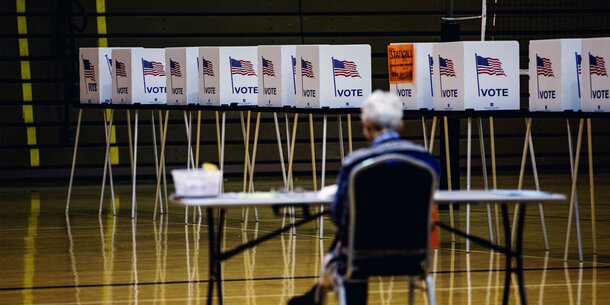The Brennan Center and our partners took legal action Thursday to stop a lawsuit that threatens to disenfranchise Michigan voters. The complaint filed by the Republican National Committee in March against state officials alleges that Michigan has failed to keep its voter rolls up to date, a claim that misreads federal law and uses flimsy evidence to pressure the state to purge eligible voters.
Along with our co-counsel at the law firm Paul, Weiss, Rifkind, Wharton & Garrison LLP, we filed a motion to intervene on the side of the state. We represent the League of Women Voters of Michigan to defend voters from this cynical quest to kick them off the rolls.
The RNC is suing under the National Voter Registration Act, a law designed to increase voter registration. It also establishes standards for voter list maintenance, including safeguards to ensure eligible voters are not accidentally removed from the rolls. The law requires states to make a “reasonable effort” to remove voters who have died or moved, but it does not demand perfect lists. Michigan’s list maintenance programs more than meet this bar. Nevertheless, the RNC is relying on a debunked methodology to claim that Michigan’s voter rolls have too many registrants and the state must purge them more aggressively.
Attempts to twist the National Voter Registration Act from a tool of civic engagement into a purging device are not new. For years, antidemocracy groups have used exaggerated claims and shaky data to pressure jurisdictions around the country into aggressive purges.
Conservative activists have tried to play this card in Michigan courts more than once — and lost. In 2020, a voter backed by the Honest Elections Project, a conservative group fighting to restrict voting access, filed a near-identical lawsuit seeking the same purges. After the Brennan Center and Paul Weiss opposed the lawsuit on behalf of the League of Women Voters of Michigan, the plaintiff dropped the case. Another similar case filed in 2019 in Detroit by the Public Interest Legal Foundation, a conservative group that has pursued aggressive purges across the country, likewise ended in voluntary dismissal after the Brennan Center and its partners intervened. A third Michigan case filed in 2021 seeking aggressive purges was dismissed by a federal court earlier this year.
The RNC’s new lawsuit is no different from these. And those are just the suits that have failed recently in Michigan — similar cases landed with a thud in states including Florida, Pennsylvania, and Virginia.
The RNC’s current case appears to be part of a larger strategy. It brought a substantially similar suit in Nevada last month. And the RNC is reportedly plotting an aggressive litigation strategy ahead of the 2024 general election. These suits cast baseless doubt on our elections and are reminiscent of the suits that election deniers filed in 2020 to justify questions about the integrity of the election’s outcome. All this at a time when the RNC is asking job applicants whether the 2020 election was stolen.
Moreover, the RNC’s legal strategy seems to be just one example of a broader trend of baseless litigation that threatens to inject chaos into the 2024 elections. Election denier groups Maryland Election Integrity and United Sovereign Americans have filed a suit asking for aggressive purges and questioning other legitimate methods of election administration in Maryland. The complaint is littered with rhetoric disputing recent elections. United Sovereign Americans is reportedly planning to bring “many suits” across the country.
Even when unsuccessful, these lawsuits threaten to undermine our elections. They force state officials to spend precious resources responding to litigation. Moreover, the suits sow disinformation about the quality of voter rolls that election deniers may use as groundwork for future lies that the 2024 election was marred by fraud. Courts should be quick to forcefully reject these claims to minimize the risks these suits pose.




